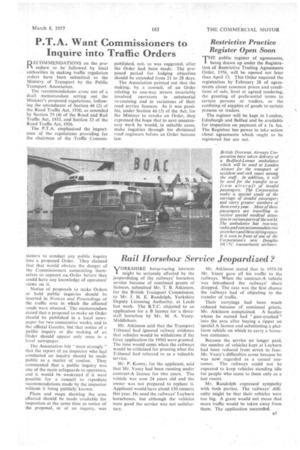Rail Horsebox Service Jeopardized ?
Page 39

If you've noticed an error in this article please click here to report it so we can fix it.
VORKSH1RE horse-racing interests might be seriously affected by the jeopardizing of the railways' horsebox service because of continual grants of licdnces, submitted Mr. T. B. Atkinson, for the British Transport Commission, to Mr. J. H. E. Randolph, Yorkshire Deputy Licensing Authority, at Leeds last week. The B.T.C. objected to an application for a B licence for a threestall horsebox by Mr. M. A. Vasey. 1),4 iddleham.
Mr. Atkinson said that the Transport Tribunal had ignored railway evidence that vehicles would be withdrawn if the Gray application (in 1956) were granted. The time would come, when the railways would be criticized for pruning what the Tribunal had referred to as a valuable service.
Mr. P. Kenny, for the applicant, said that Mr. Vasey had been running under contract-A licence for two years. The vehicle Was now 24 years old and the owner was not prepared to replace it. Applicant would have about 150 runners this year. He used the railways' T.eyburn horseboxes, but although the vehicles were good the service was not satisfactory. Mr. Atkinson stated that in 1953-54 Mr. Vasey gave all his traffic to the railways. When the contract-A vehicle was introduced the railways' share dropped. The ease was the first chance the railways had of objecting to the transfer of traffic.
Their carryings had been much reduced because of continual grants, Mr. Atkinson complained. A haulier whom he named had "gate-crashed " into the area after buying a tipper on special A licence and substituting a platform vehicle on which to carry 21 horsebox container.
Because the service no longer paid, the number of vehicles kept at Leyburn had been reduced from seven to four. Mr. Vasey's difficulties arose because he was now regarded as a casual customer. The railways could not be expected to keep vehicles standing idle for people who came to them only as a last resort.
Mr. Randolph expressed sympathy with both parties. The railways' difficulty might be that their vehicles were too big. A grant would not mean that more traffic would be taken away from them. The application succeeded.




































































































